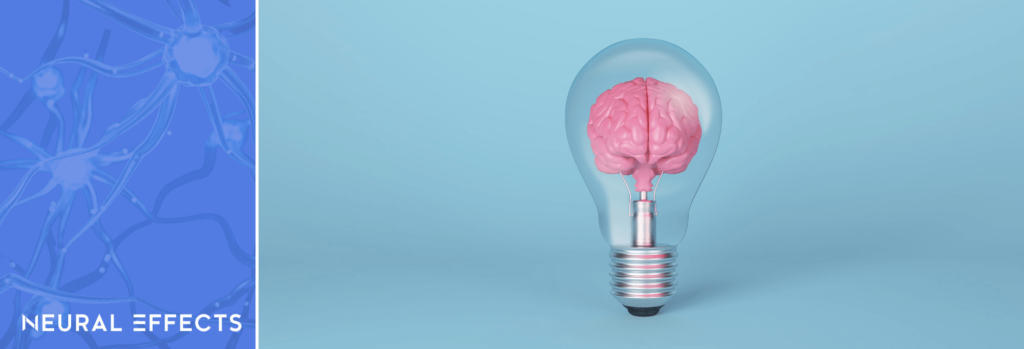If you think you have a concussion and are looking for treatment options, finding the right concussion center can have a significant impact on your ability to heal quickly. However, the types of treatment and quality of care offered by different concussion centers vary widely.
Some healthcare providers still advise patients to isolate themselves in a dark room with minimal stimulation after sustaining a head injury, for example. This practice — known as “cocooning” — is now considered outdated advice. Recent research shows that this method fails to help with concussion recovery and may actually delay the recovery process.
Other centers have minimal in-house staff and rely on referring patients to outside doctors and locations to receive treatment. In addition to being inconvenient for patients who need to visit different facilities to receive care, the care they receive often isn’t as effective when their therapists don’t communicate and coordinate closely with each other. Again, this can delay the patient’s recovery.
At Neural Effects, we specialize in an active form of concussion treatment that involves aerobic exercise combined with a variety of different therapies, including cognitive, vision, vestibular, and physical therapy. Instead of cocooning, patients can start treatment as early as 48 hours after their concussion. And because our team is all under one roof, our therapists are in constant communication with each other to ensure they can coordinate treatment and maximize each patient’s chances of recovery.
In this post, we’ll cover:
If you live in Provo, Salt Lake City, or anywhere else in the Utah valley area, we can help you recover from your concussion and reduce your chance of long-term symptoms. We are in network for most types of medical insurance. Schedule your evaluation today.
Factors to Consider When Choosing a Concussion Center
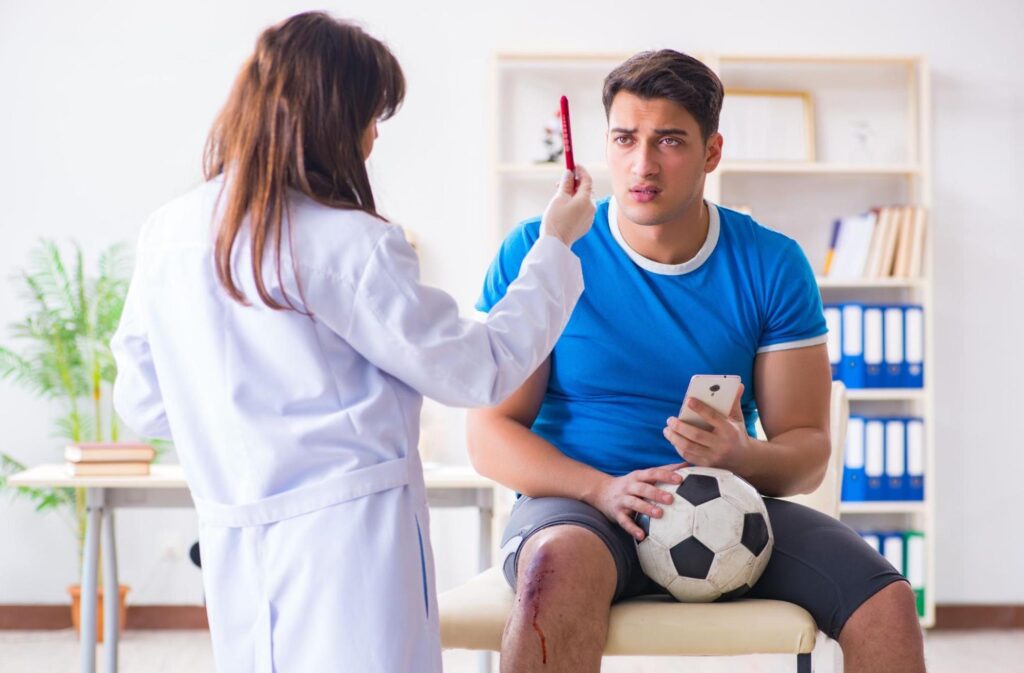
Initial Assessment
Good concussion centers provide a thorough assessment before offering therapy designed to help you recover more quickly. In most cases, this includes:
- A review of the patient’s medical history and medical records
- A review of the patient’s symptoms
- A series of neurocognitive tests to assess memory, concentration, language, and other cognitive skills
- A physical assessment to identify problems with balance, posture, and other physical symptoms
- A psychological evaluation to spot signs of anxiety, depression, and other mental health issues
Some centers offer baseline testing and return to play services for athletes of any age, including adolescents, teenagers and adults. This involves taking a cognitive test at the beginning of the season to establish a normal baseline. If that player suffers an injury that may have caused a concussion, they retake the test during their assessment to check their brain function.
Patient Assessment at Neural Effects
This is the type of thorough assessment that we offer at Neural Effects. Patients meet with a member of our medical team and discuss what led to the concussion they suffered. Was it a car accident? Was it a sports injury? Knowing how your injury happened will help us during your physical and cognitive testing.
During this examination, patients also:
- Rate their concussion symptoms: From a checklist of possible symptoms, patients rate their symptoms from zero (no symptoms) to six (worst possible).
- Review their medical history: Next, our doctors ask detailed questions about the patient’s medical history, including before the concussion. This information is crucial to help our therapists customize the treatment offered to each patient. For example, if the patient has respiratory problems or mobility issues, then we can adjust any activities that involve intense physical exercise.
- Undergo a cranial nerve exam: A cranial nerve exam assesses the twelve cranial nerves that control movement and senses, such as eye movements, facial muscles, and others. Some patients may need to see a neurosurgeon if the damage to these nerves is severe.
- Undergo a cervical spine exam: During this exam, our therapists will check your spine, neck, arms, and hands to spot any fractures or herniated discs. We also measure muscle strength and evaluate whether strength is the same on both sides of the body.
- Undergo a balance assessment: Patients complete a Balance Error Scoring System (BESS), where they carry out a series of tasks with their eyes closed. If you watch sports, you may have seen this test performed on athletes to check for signs of a concussion if they hit their head during a game.
- Undergo a visual assessment: Patients are also assessed for visual problems. Vision-related symptoms are common after a brain injury, including changes to peripheral vision, depth perception, and ability to focus.
Our team may also request a CT or MRI scan for some patients. This scan cannot be used for a concussion diagnosis but can detect skull/neck fractures or bleeding in the brain. We have access to the equipment needed, and patients can get these done promptly if we think it’s necessary. Some cases are serious, and patients may need urgent care and a surgical intervention, so we are prepared to act quickly if needed.
All this information is then combined and used to help our therapists understand what systems were most affected by the concussion and how our treatment can help. For example, if patients struggle with dizziness and balance problems, our therapists will spend more time doing vestibular exercises; if most of the symptoms are vision-related, our therapists will emphasize eye-related exercises.
Most patients are ready to start rehabilitation immediately. For the patients that come to us straight after their concussion, at most, they’ll wait 48 hours as this is the recommended time to rest after a concussion. Occasionally, we uncover serious neurologic problems, such as multiple sclerosis or Parkinson’s Disease, and we refer patients to a specialist for further treatment.
What to Avoid
If you come across a medical center offering essentially the same treatment to all patients despite their symptoms and without a detailed evaluation before treatment, then our advice is to seek treatment elsewhere. Concussions are like fingerprints; they’re all different, and patients need to be assessed before treatment starts to find out exactly how their concussion affected their systems.
Concussion Treatment
Treatments for concussions vary significantly from center to center. Good centers should offer a multidisciplinary approach using a combination of different types of therapies to address concussion symptoms. Some of the most common types of therapy offered include physical therapy, vision therapy, and vestibular therapy to address symptoms such as dizziness, balance issues, difficulty with eye tracking, and double vision, for example.
Treatment at Neural Effects
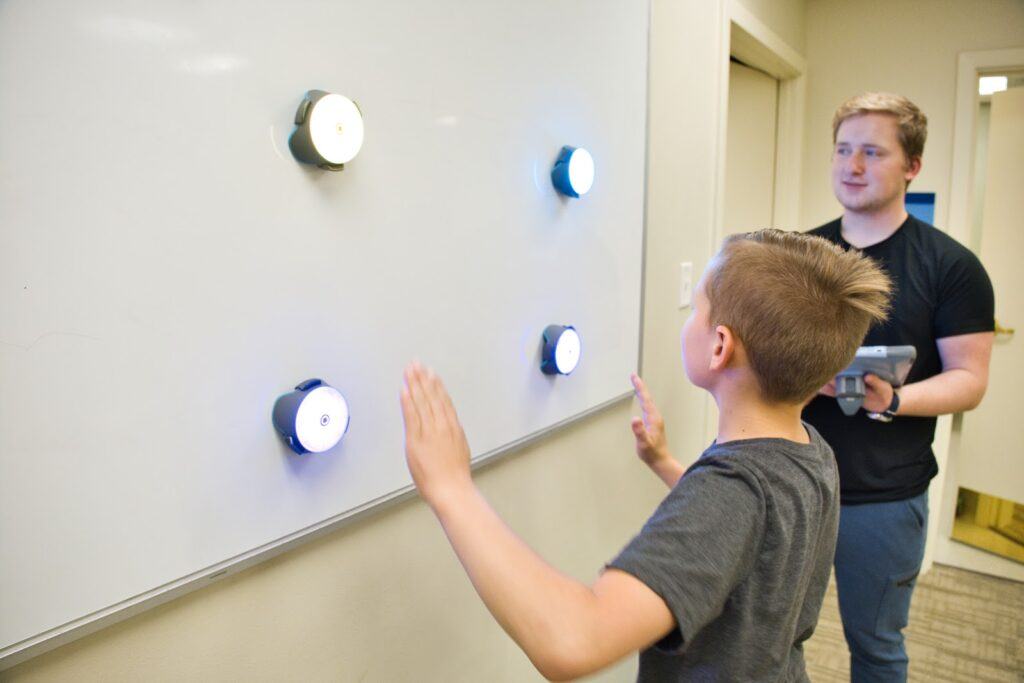
Physical therapy (including vision and vestibular therapy) may be enough to treat some patients, but, we’ve found that using a combination of physical and cognitive therapies is often necessary to treat concussed patients.
As such, some of the therapies we use include:
- Physical therapy: All our sessions start with cardio exercises, typically on a treadmill or a stationary bike. Our therapists are trained to make sure patients exercise enough to raise their heart rate, which in turn improves blood flow to the brain — crucial for the areas affected by the concussion — but not so much that it triggers symptoms. This is known as exercising at the sub-symptom threshold.
- Cognitive therapy: After exercise, patients then engage in a variety of cognitive activities where patients complete different tasks, such as finding hidden patterns, solving logic puzzles, and memorizing images. Neural Effects is one of the few concussion clinics in the U.S. that combines both physical and cognitive therapy to treat concussed patients.
- Neuromuscular therapy: The aim is to work both the body and brain together using various exercises, such as balancing on a Bosu ball while playing a memory game or hitting targets in random patterns to improve reaction time. This therapy also includes massage of neck muscles that are often painful and strained after a concussion and may cause headaches, balance, and visual issues.
- Vision therapy: Our therapists are trained to use a variety of exercises to improve visual skills such as depth perception, hand-eye coordination, eye tracking, focusing, and peripheral vision. These exercises also improve communication between the eyes and the brain to resolve visual issues.
- Vestibular therapy: During therapy, we address symptoms such as dizziness and problems with posture. Exercises often involve gently moving the head around to specific positions, forcing eye gaze to shift and refocus to improve function. The aim is to get the eyes and vestibular system working together again.
- Breathing exercises: Finally, patients also learn a variety of breathing techniques to help them relax and recover from exercise without triggering symptoms. Patients can continue to use many of these breathing techniques at home after treatment to help during their recovery.
What to Avoid
If you’re looking for a concussion center, it’s important to find out about what kind of treatment they offer. Some of the red flags that we advise against include:
- Outdated Advice: If a concussion center advises you to rest in a dark room until your symptoms subside, they’re not following the latest medical recommendations. As we mentioned earlier, this approach is known as cocooning, and, although it was considered best practice for a long time, recent research shows that it can actually prolong recovery time. Instead, the latest advice is to rest for 2 days after the concussion and then actively start treatment and gradually return to normal daily activities.
- Reliance on medication or supplements: If your concussion center is quick to give you prescription medications or supplements as the sole option to treat your symptoms, such as nausea or headaches, our advice is to seek care elsewhere. While meds can be useful to control specific symptoms in the short term, they should not be seen as a cure for concussion. You need to find a provider who can identify how the concussion has affected your body and develop a plan to treat it.
Medical Team
Concussions can be a challenging condition to treat. Good concussion centers rely on a team of concussion experts specialized in different medical specialties, allowing them to offer treatment plans addressing specific symptoms for each patient.
Professional care teams may include:
- Physicians
- Neurologists
- Neurosurgery specialists
- Endocrinologists
- Pain management specialists
- Sleep medicine experts
- Athletic trainers
- Physical medicine and sports medicine doctors
- Primary care doctors
- Physiotherapists (physical therapists) and rehabilitation therapists
- Psychologists and neuropsychologists
- Occupational therapists
- Speech-language therapists (speech therapy)
- Vision and vestibular care specialists
Not all clinics will have all these healthcare professionals, but having some variety — at least two or three different specialists — is a decent indication that they have a good program to treat concussed patients.
The Team at Neural Effects
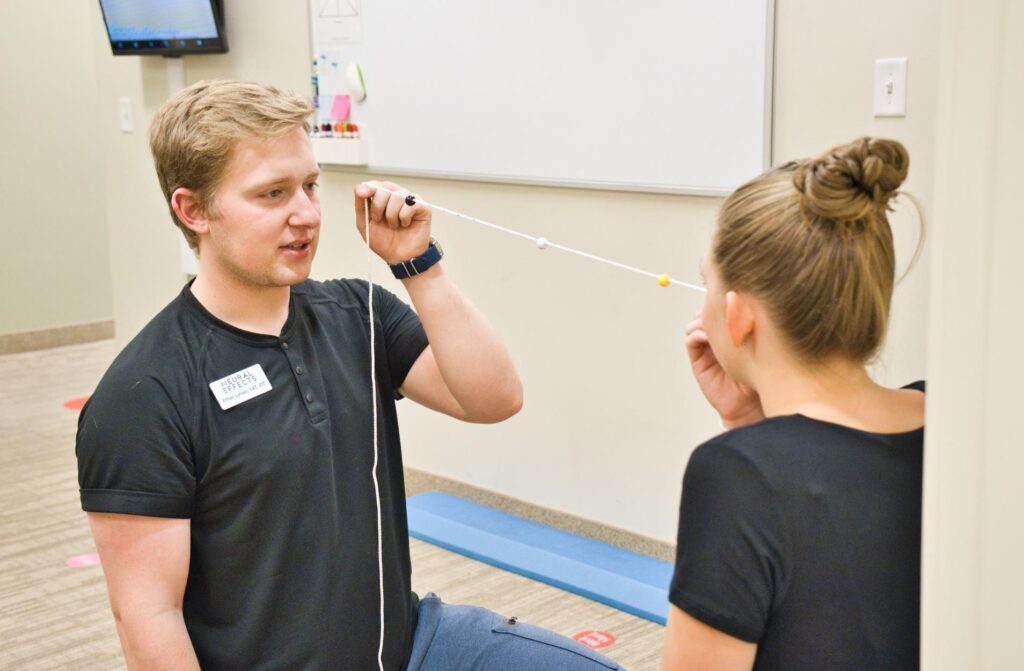
Our team at Neural Effects includes a variety of specialists covering the therapies we offer. In many cases, different therapists work closely together and organize therapy sessions using exercises from more than one discipline to help the patient’s brain adjust to multiple inputs.
What to Avoid
Be wary of places claiming they can treat a wide variety of conditions, from concussions to autism, with the same team of experts. There are good medical centers and hospitals that can treat many different medical conditions, but they will have a small team specialized in each one. You need to find a specialized team of professionals — either in a small concussion center or as part of a larger organization — to treat your concussion.
Location
Typically, larger concussion centers will have all their medical team in-house, while smaller clinics will have only one or two specialists on their team and then refer patients to outside locations as needed. For these smaller centers, the crucial point to consider is how therapists from different offices communicate with each other regarding the patient’s progress.
This option can work well if all healthcare professionals involved are in constant communication and can adjust their treatment as needed to help the patient recover faster. However, this can be tricky to achieve, and it’s easy for contact to break down, which can have a serious impact on the patient’s recovery. If a patient needs vision therapy, vestibular therapy, and cognitive therapy, for example, but these therapies are done by therapists who aren’t communicating and adjusting their treatment as needed, whatever benefits patients are getting from one type of therapy could be disrupting their progress in another type of therapy.
From the patients’ point of view, going to different places will take a lot more time and effort to receive coordinated care, including scheduling appointments in different offices, driving to different locations, and getting to know different procedures. Inevitably, it can take a lot longer to heal and recover from a concussion.
All In-house at Neural Effects
At Neural Effects, we believe having the entire team under one roof is ideal for both the patient’s experience and treatment outcomes. All of our therapists work closely together, and patients can engage in exercises addressing different issues at the same time, which would not be possible if patients had to travel to see different therapists.
What to Avoid
If you find that you’re expected to visit multiple locations to get your treatment, but the different specialists don’t know what other therapies you need, it’s a very strong sign that communication is insufficient. Also, if they suggest that you may need some form of therapy or second opinion about your condition, but cannot offer a referral to a reliable and trustworthy therapist, they are not offering a complete treatment for your concussion. It may be time to find a different concussion center.
Support After Treatment
Good concussion centers offer some support after treatment is completed. This could be additional appointments to check on the patient’s progress or resources to help deal with symptoms at home.
Post-Treatment Support at Neural Effects
At the end of each session, our patients meet with one of our therapists and receive a series of exercises to do at home to help with progress. Typically, these include cardio exercises, cognitive games, and breathing techniques. We highly recommend doing these exercises at home as they significantly increase the patient’s chances of a complete recovery.
What to Avoid
Even after treatment, it can take some time for all symptoms to dissipate, and patients need some support while they recover. Concussion centers that do not offer any post-treatment advice and support are not really offering a complete treatment. When seeking a concussion center for treatment, our advice is to inquire about the types of treatment available as well as the support provided afterward.
If you live in Provo, Salt Lake City, or anywhere else in the Utah valley area, we can help you recover from your concussion and reduce your chance of long-term symptoms. We are in network for most types of medical insurance. Schedule your evaluation today.
Where to Find a Concussion Center Near You
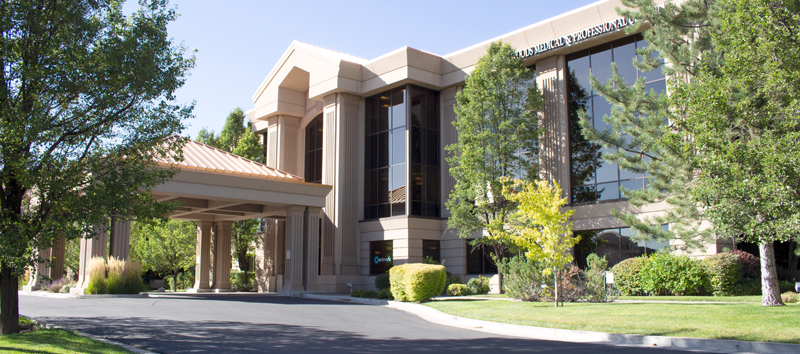
While we would recommend that anyone with a concussion seek treatment at our concussion center, Neural Effects, we understand that not all patients can visit us for treatment.
To help you find the best concussion center near you, take a look at the list below with concussion centers organized alphabetically by each state. Even if you find a concussion center included in this list, we still recommend that you find out as much as you can about them, including what treatment they offer and what specialists they have on their team. Just because it’s on the list doesn’t mean it’s the best option for you.
Concussion Clinics in Each State
Concussion Center in Alabama
- Lemak Health
- Children’s of Alabama Concussion Clinic
- CSM Champion Sports Medicine (specialized in sports-related injury with physical therapy)
- UAB Spain Rehabilitation Center
Concussion Center in Alaska
- List of known concussion healthcare providers in Alaska
- PeaceHealth Southwest Medical Center Sports Concussion Rehabilitation Program
- Alaska Neurology Center(walk-in clinic)
- Anchorage Alaska Brain Injury Doctors
Concussion Center in Arizona
- Mayo Clinic
- Banner Health
- SPARCC (specialized in sports-related injury)
- Barrow Neurological Center
Concussion Center in Arkansas
- University of Arkansas Schmieding Developmental Center
- Arkansas Neuropsychology and Behavioral Health (specialized in cognitive rehabilitation)
- Baptist Health
Concussion Center in California
- UCSF Sports Concussion Clinic
- Stanford Brain Performance Center
- UCSD Sports Concussion Clinic
- Concussion Medical Clinic
- Cottage Health
Concussion Center in Colorado
- Banner Health
- Next Level Sports Performance
- Colorado Concussion Clinic
- Concussion Program at Children’s Hospital Colorado
Concussion Center in Connecticut
- Greenwich Sports Medicine at Twin Rinks
- Gaylord Center for Concussion Care
- Advanced Concussion Solutions
- New England Institute for Neurology and Headache
- Physical Therapy and Sports Medicine Center (offers physical therapy, including vestibular and balance rehabilitation)
Concussion Center in Delaware
- Nemours Children’s Health
- Christiana Care Health System
- Mid-Atlantic Concussion Alliance
- Phoenix Physical Therapy (not specialized in concussion treatment but offers physical and occupational therapy)
Concussion Center in Florida
- Mayo Clinic
- Nicklaus Children’s Hospital (specialized in children)
- Holy Cross Health
- University of Miami Concussion Program
Concussion Center in Georgia
- Northside Hospital Orthopedic Centers
- Children’s Healthcare of Atlanta
- The Concussion Center
- Southeast Georgia Health System
Concussion Center in Hawaii
- Imua Physical Therapy
- Hawaii Pacific Neuroscience
- Hawaii Sports and Balance Center
- Doctors for concussion in Honolulu
Concussion Center in Idaho
- St. Luke’s
- St. Alphonsus (STARS) Concussion Program
- Eastern Idaho Spine, Sports, and Rehab Center
- Northwest Accident and Injury Clinic
Concussion Center in Illinois
Concussion Center in Indiana
Concussion Center in Iowa
Concussion Center in Kansas
Concussion Center in Kentucky
- KORT
- Neuro Restorative (not specialized in concussion treatment, but offers physical, occupational, and speech therapy)
- Kentucky Neuroscience Institute
- Benchmark Physical Therapy
Concussion Center in Louisiana
Concussion Center in Maine
- Maine Health
- Neuropsychology & Concussion Management Associates
- The Portland Clinic (specialized in sports-related injuries)
Concussion Center in Maryland + District of Columbia
- Kennedy Krieger Institute Concussion Clinic
- MedStar
- University of Maryland Medical System
- XLNT brain support
- Elevated
Concussion Center in Massachusetts
- Massachusetts General Hospital Sports Concussion Clinic
- Boston Children’s Hospital
- Massachusetts Concussion Specialists
- Southcoast Health
Concussion Center in Michigan
- Lighthouse Neurological Rehabilitation
- Spectrum Health
- Henry Ford Health System
- Neal Alpiner (physical rehabilitation)
- University of Michigan Concussion Center
Concussion Center in Minnesota
Concussion Center in Mississippi
- UMMC Health Care
- Baptist Concussion Center
- Elite (specialized in physical therapy)
- FYZICAL
Concussion Center in Missouri
Concussion Center in Montana
Concussion Center in Nebraska
- Nebraska Medicine
- Columbus Community Hospital Concussion Management Clinic
- FYZICAL Clinics
- Children’s Hospital and Medical Center
- Methodist Concussion program
Concussion Center in Nevada
- Anders and Associates Physical Therapy
- Neurology center of Las Vegas
- Barton Center for Orthopedics and Wellness
Concussion Center in New Hampshire
- Access Sports Medicine & Orthopaedic Clinics
- Core Physicians
- New Hampshire Neurospine Institute
- Access
Concussion Center in New Jersey
- Atlantic Health System
- Hackensack Meridian Health
- New Jersey Concussion Center
- Sports Concussion Center of New Jersey
- Balance and Concussion Therapy Center
Concussion Center in New Mexico
Concussion Center in New York
- Match Fit Performance
- NYU Langone Health
- NYC Traumatic Brain Injury Center
- Concussion management of New York
Concussion Center in North Carolina
Concussion Center in North Dakota
- Sanford Health
- Optimum therapies of North Dakota
- North Dakota Brain Injury network
- Apex (physical therapy)
Concussion Center in Ohio
- Cleveland Clinic
- Nationwide Children’s Concussion Clinic
- Ohio State University Wexner Medical Center
- Orthopaedic Associates of Zanesville
- Mary Rutan Hospital
- Cincinnati Children’s
Concussion Center in Oklahoma
Concussion Center in Oregon
Concussion Center in Pennsylvania
- UOC Comprehensive Concussion Care Clinic
- UPMC Sports Medicine
- Penn Medicine
- LVHN Head Trauma and Concussion Program
- Penn Highlands Healthcare
Concussion Center in Rhode Island
Concussion Center in South Carolina
Concussion Center in South Dakota
Concussion Center in Tennessee
- Vanderbilt Sports Concussion Center
- Knoxville Orthopaedic Clinic
- Tennessee Sports Medicine Group (physical therapy)
- The Next Level
- Foothills Physical Therapy & Sports Medicine Center (physical therapy)
Concussion Center in Texas
Concussion Center in Utah
Concussion Center in Vermont
Concussion Center in Virginia
Concussion Center in Washington
- Providence Health & Services
- MedStar Sports Medicine
- Swedish
- Washington State Healthcare Providers
- Lake Washington Physical Therapy
- Peak Medicine
Concussion Center in West Virginia
- Marshall Sports Medicine Institute
- WVU Medicine Sports Medicine Center
- Charleston Area Medical Center
- Inova
Concussion Center in Wisconsin
Concussion Center in Wyoming
- Campbell County Health Rehabilitation Services
- Spine and Injury Clinic of Laramie
- Teton Physical Therapy
If you live in Provo, Salt Lake City, or anywhere else in the Utah valley area, Neural Effects can help you recover from your concussion and reduce your chance of long-term symptoms. We are in network for most types of medical insurance. Schedule your evaluation today.
